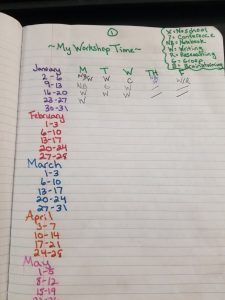With Writing, Quantity Begets Quality
 “There are no more words left in me to write, I think.” (Read with melodramatic hand on brow, maybe even a Southern belle accent for an extra flair of drama.)
“There are no more words left in me to write, I think.” (Read with melodramatic hand on brow, maybe even a Southern belle accent for an extra flair of drama.)
A student of mine said this the other day as I returned the class’ most recent essays and started describing our next writing adventure. I am lucky to teach both AP Language and Composition and AP Seminar (a new, research-writing based course) this year. The young lady who made the dramatic pronouncement has the pleasure (?) of being in both. That means she did a lot of writing this fall. A crazy amount of writing.
And exactly the right amount of writing, I think.
She’s not the only student in this position. I have about 15 overlappers, and they’ve really made me rethink the amount of writing I’m doing in my classes. Despite the dramatic “there are no words left” comment, they actually have quite a few words left, and those words are getting more insightful and more interesting. All of that writing is paying off–and I think they know it.
I always thought I had a lot of writing in my classes. But watching how far my overlappers’ writing is coming, I’m realizing that maybe they need even more. Kelly Gallagher, a reading-and-writing-teacher guru, is often quoted as saying, “Students should be writing way more than a teacher can grade.” Though I know that’s true, I have never really embraced it fully. I have been so caught up in the idea that I need to give feedback in order to help them grow, that I thought that meant grading everything. It simply wasn’t possible for them to write and write and write and write, if I wasn’t going to write all over it. Right?
Copy/Paste
Wrong. There are plenty of smaller writing activities that I could replicate in each class, and I have different strategies from each class that could be copied and pasted into the other. My students shouldn’t need to be in two of my classes to get such a flood of writing opportunities. There are four things I’ve been doing on and off in each class this fall. What if I did all four things consistently in both classes?
Bullet Journals
My AP Seminar kids have been experimenting with different ways to reflect on their research process all year, and most recently, we’ve started bullet journals. I hesitated to start this with my Lang students because I already had writing notebooks in AP Lang. But, my notebooks in Lang are inconsistent. Bullet journaling would force daily reflection and guarantee that my students would never go a day without writing at least a few lines.
Holistic Feedback
The other thing I’ve been very good about in AP Seminar is giving consistent holistic feedback. There is one, 4-point, simple scale in my Seminar class. Because my students have worked with that scale all year, it works as shorthand with us now. A 3 scribbled in the margins tells them just as much as a paragraph of feedback. And it’s a lot faster. AP Lang has a holistic, 9 pt scale, but it’s not simple and isn’t as clear to my students. If I could break the scale down for them more and help them see the levels more clearly, I could start using this practice in that class as well.
Write Two, Choose Your Best
I often ask my AP Lang students to write two different pieces (different days) and then choose the best one for me to evaluate. This works really well in AP Lang because sometimes students feel great about one analytical piece and horrible about the next one. This both removes the pressure and pushes them to be a little more critical of their own writing. I hadn’t thought about doing this in AP Seminar because all of our writing has been long, workshopped pieces. But, I need to do a better job of assessing my Seminar students’ reading, and this strategy would work well with that.
Self-Annotation
One of the ways I save time prior to writing conferences in AP Lang is by asking the students to annotate their own essays with reflective comments and questions. What were you trying to accomplish with a particular section? Why did you choose one word rather than another? This reflective writing has been absent from my Seminar class, and I think I need to add it.
*
When my son was a baby, his pediatrician used to tell us, “Sleep begets sleep.” Put him to bed early, make sure he gets lots of naps, and he will sleep perfectly. My pediatrician was right. Lots of sleep led to better sleep.
This fall I learned the same thing about my writers. Lots of writing leads to better writing. Quantity begets quality. This spring, I’ll see if I can up the writing in each class. My poor overlappers don’t know what they’re in for.
 Hattie Maguire (@TeacherHattie) is an English teacher and Content Area Leader at Novi High School. She is spending her sixteenth year in the classroom teaching AP English Language and Composition, AP Seminar and doing Tier 2 writing intervention. She is a National Board Certified Teacher who earned her BS in English and MA in Curriculum and Teaching from Michigan State University.
Hattie Maguire (@TeacherHattie) is an English teacher and Content Area Leader at Novi High School. She is spending her sixteenth year in the classroom teaching AP English Language and Composition, AP Seminar and doing Tier 2 writing intervention. She is a National Board Certified Teacher who earned her BS in English and MA in Curriculum and Teaching from Michigan State University.

